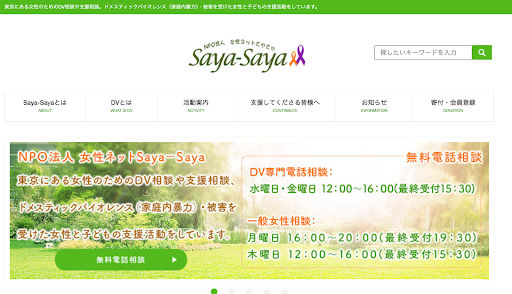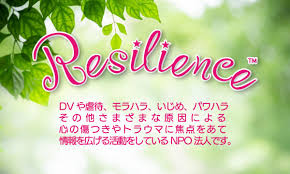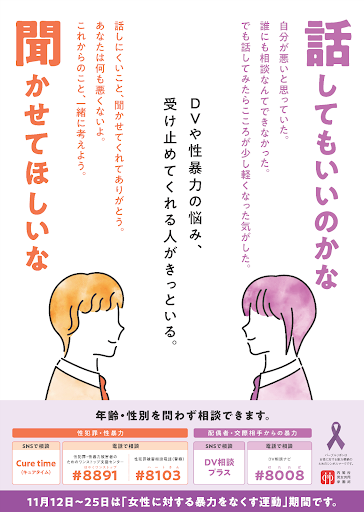Since 2020, awareness of domestic violence in Japan has been increasing, evident in the rise in cases reported to the police and the willingness to seek help from professionals. However, just awareness is not enough in Japanese society. In March 2024, The Japan Times reported that 1 in 5 have experienced partner abuse and 1 in 4 have experienced spousal abuse. Because Japanese culture often emphasizes the notion of “self-blame,” it becomes difficult for victims to leave abusive relationships.

In an email, Kana Numaguchi, the Secretariat of NPO Saya-Saya, highlighted a critical issue: “One of the most prevalent misconceptions surrounding domestic violence is the tendency to blame the victim for the abuse they endure.” This misconception can discourage victims from speaking out and seeking help, as they may internalize this blame. Numaguchi also further elaborated on another misunderstanding: “Another common belief is that a man who is abusive towards his wife can still be a good father to his children. In reality, a father who harms the mother, a figure central to his children’s lives, cannot be considered a positive parental influence in any regard.” This statement highlights the barriers victims face when contemplating divorce, as societal norms may lead them to believe that staying in an abusive relationship is in the best interest of their children.
As of May 2024, the Diet has made recent calls for the expansion of the Family Court system in response to concerns that previous rulings have inadequately addressed the needs of victims of domestic abuse, leaving them without sufficient legal protections and support. Previously, the Civil Code of Japan stipulated that when the parents of a child divorced, only one would be given complete parental authority—completely excluding the other parent. As a result, a disconnect can occur between the parent and child, leaving the other parent excluded from the child’s life without any means of communication. Due to this disconnection, it may be difficult to determine whether or not a child is being abused after divorce. However, the court now requires investigations of both individuals to settle court custody disputes.
The Yomiuri Shimbun reported that a new ruling has now overhauled the matters regarding child custody: if family courts can properly assess the situation and gather evidence of domestic violence, then there would be a ruling of sole custody for the parent who is not involved in the abuse. With this new ruling in child custody, the law enforces a shift in societal norms: survivors of domestic violence are now required to report their experiences to ensure that the Family Court system’s new protections and procedures are effectively implemented. As a former family court investigator and deputy director of the Tokyo-based Family Problems Information Center, Setsuo Shimosaka stated in the same article: “In many cases of domestic violence that occur behind closed doors, there are no recordings or documentation to serve as evidence.” Because of the enactment of this law, it is slowly becoming the norm for survivors to pursue charges against abusers.

Additionally, the increase in technology usage and the advancements made during the COVID-19 pandemic have allowed more victims to seek help. There is also a forum on Yahoo called Chiebukuro, where victims may anonymously ask others for advice and share their experiences of abuse. In addition to the forums, many organizations in Japan (such as Resilience and TELL) have been working towards spreading awareness of the rising cases of domestic violence.
Various non-profit organizations have been working to address the issue of domestic violence, offering support and resources to vulnerable groups. One such organization is the NPO Saya-Saya, which has developed concurrent psychoeducational programs aimed at assisting individuals in need. Dedicated to advocating the rights of women and children affected by domestic violence, Saya-Saya has been working on implementing their programs: “Ring,” which supports mothers and children; “Sun,” which supports female victims and aims for self-reliance; and “Change” which trains young women in Japan to protect themselves. Through working with attorneys and government agencies, Saya-Saya also furthers their cause using the recently created consultations on the application LINE. The organization also wishes to eradicate misconceptions of domestic violence through its work, emphasizing the importance of education and awareness in changing societal attitudes toward domestic violence. Their efforts include outreach programs, counseling services, and workshops that foster community engagement and mental health awareness.
Furthermore, Saya-Saya has also had many successes with domestic violence survivors. After receiving aid from Saya-Saya, Numaguchi states in the email that many survivors are working with Saya-Saya as support workers. Children who participated in the Saya-Saya programs in elementary or junior high school are now helping the organization as volunteers after graduating.
Currently, it has become crucial for the Japanese government to provide financial support to organizations like Saya-Saya, Resilience, and TELL. Because the biggest opposition towards their activities is the dependence on and approval of grants, they must receive the aid and assistance of the government to continue their operations. It also becomes critical that the community engages with the services that the organizations run to support the victims.
As a society, it is only through collective action and financial support from the government that we can hope to reduce domestic violence and ensure that victims seek help without stigmatization.

“Do you want to talk?”
“I wonder if anyone would listen.”
DV (domestic violence) and concerns about sexual violence are something that people are experiencing. It might be difficult to talk about, but you are not alone.
Please talk about this together with someone you trust. Consultations are available regardless of age or gender.









